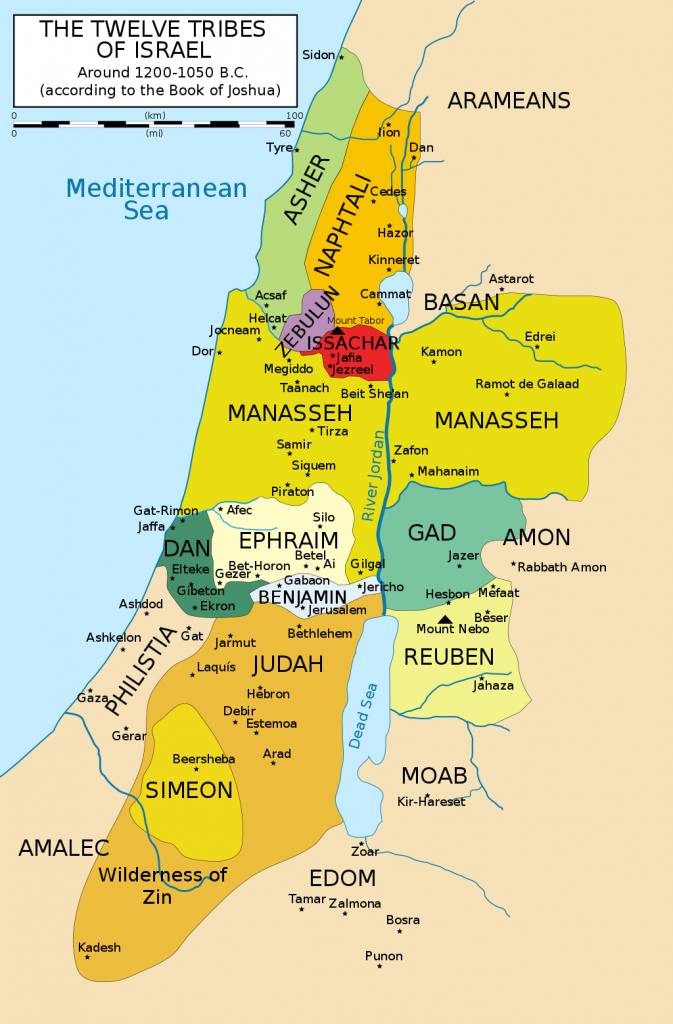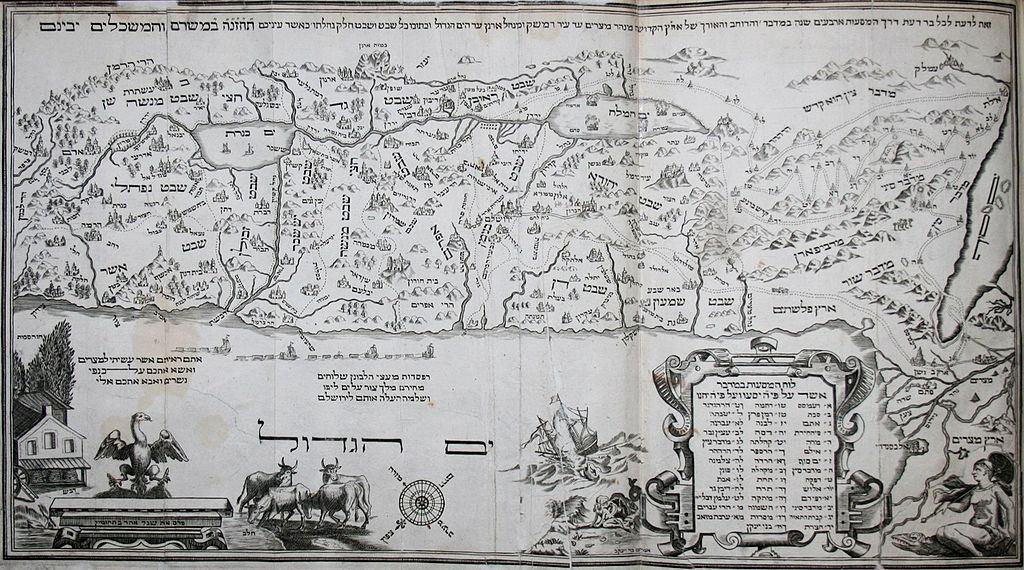As Israel begins producing natural gas from the Leviathan Field for the world market, there is a sense that just as the prophets foretold the entire nation will be transformed by the profits

Copyright: Gustave Doré [Public domain]
In the fullness of time, there will be a feast for the souls of the righteous. On the menu is the meat of the Leviathan, the storied giant fish of Biblical mention. Talmud Bava Batra 75a explains that the skin of the Leviathan will be spread over the meal’s guests as the glowing roof of a “sukkah” hut. The leftover skin will adorn the walls of Jerusalem and radiate its luminosity from one end of the Universe to the other.

Copyright: Michael Sgan-Cohen (מיכאל סגן-כהן) [CC BY-SA (https://creativecommons.org/licenses/by-sa/3.0)]
To understand this mysterious image, we must study the blessings of Jacob regarding the olive trees of the Tribe of Asher and the present-day blessings of the aptly-named Leviathan oil fields. Over a week ago and just after Hanuka this year, Israel began pumping natural gas from offshore deposits under the Mediterranean Sea in the Leviathan Basin. Israeli companies are reaping the initial rewards of a decade of speculation, exploration and prospecting.
Whether or not the gas bonanza will unite in peace those Levantine countries who exploit the field is a topic we may cede to pundits and political scientists. A yeshiva rabbi of mine firmly opines that Israel should have kept the Sinai in the 1970s as the spoils of the Yom Kippur War. The future development of then-yet-unknown oil deposits would have provided economic and political independence from the poisonous allegiance to Washington’s foreign policy demands and an attendant need to spend billions of dollars of American aid with American defense firms. Thirty years later, a time may have now arrived for Israel to confidently depart its Cold-War role as a financially beholden American proxy.
Whether or not the seafloor so far from the Israeli coast is the Land of Israel within the territorial waters of the Biblical Promised Land is a query we’ll leave to the fruits of an intensive study of the first chapter of Talmud Gittin by my colleagues. At stake, perhaps, is whether or not the promise of economic expansion, energy self-sufficiency, and the potential for regional stability from the stone floor of the ocean are obliquely referenced in a blessing of the Song of Moses for “oil from the flinty rock” along with the Land’s milk and honey.
More enigmatic are the deathbed blessings which both Jacob and Moses bestowed upon the individual Israelite Tribes. The great Hasidic neophyte, Rabbi Leibeleh Eiger, was bothered by Jacob’s rich prophetic words for each of the progenitors of the 12 Tribes. Jacob graphically forecasts for each of his sons the distinct and dynamic bounty of his tribal descendants in their Biblical territory. Rabbi Eiger wonders why Jacob would risk inciting jealousy among his sons in the precarious early years of their Egyptian exile at the end of the Book of Genesis.
After all, Jacob’s favoritism towards Joseph, manifest in the gift of a tribal robe, stoked the brewing hatred of his other sons. Joseph’s brothers were already irked by his playing a tattletale and by arrogantly pronouncing his dreams of ruling over them. Jacob’s preferential treatment of Joseph resulted in the sale of Joseph as a slave in Egypt, the incessant mourning of Jacob who thought him dead, and two decades of gnawing guilt among the 10 brothers guilty of dispatching the little snitch. Any perceived favoritism in Jacob’s final blessings might plunge the Israelite clan back into factiousness.
This place in time was also fraught with uncertainty. The Israelites were now in Goshen, where they lived as prosperous foreigners near the mouth of the Nile. They abided as monotheistic legal aliens in an otherwise idolatrous Egypt. Their foremost personality was Joseph, was chief vizier in Pharaoh’s court. Jacob’s distinct, unique parting blessings might cause the same problems all over again. Any fracture among Jacob’s sons and their nascent tribes might prove disastrous for the family in such a perilous setting.
The c.1600 Kli Yakar commentary of Rabbi Shlomo Ephraim Luntschitzer, chief rabbi of Prague, insists that this very question is especially pertinent to the blessing which Jacob bestows upon his son Asher and his descendants in Genesis chapter 49. These portents pertain to the Asherites who will settle their Israelite land holdings in what is now the coastal plain of the Galilee between modern Haifa and the mouth of the Litani River – a strip facing the largest known natural gas deposits of the Leviathan Basin.
Jacob blesses Asher: “As for Asher, his bread [or ‘sustenance’] shall be fat [or ‘oil’], and he shall give kingly delicacies.”
This blessing echoes the Asherites parting blessing from Moses centuries later: “And of Asher, he said: blessed be Asher above sons; let him be the favored one of his brothers, and let him dip his foot in oil.”
The tribal blessings of Moses serve to prophetically explicate and expand upon those of Jacob. If so, then we’ve seen this movie before: Asher is the new Joseph, a new “tribal favorite” to incense his brotherly tribes with deadly jealousy. How are these blessings productive and how can Jacob be party to a repeat of his seemingly poor parenting earlier in Genesis?
Talmud Menachot 85b illustrates a fact obvious today, Asher’s land will be rich with olive trees and olive oil production. The Asherite city of Gush Halav, today the Maronite (Lebanese Christian) village of Jish, provisioned a destitute trader from Asia Minor seeking olive oil during a drought in his region. The Asherites had oil to spare – they fed him and literally bathed him in tubs of their product. Rabbi Luntschitzer reminds us that Asherites also provided the olive oil required for so many Temple rituals such as the daily lighting of the Menorah and the proper preparation of flour offerings.

Copyright: 12 tribus de Israel.svg: Translated by Kordas12 staemme israels heb.svg: by user:יוסי12 staemme israels.png: by user:Janzderivative work Richardprins [CC BY-SA (http://creativecommons.org/licenses/by-sa/3.0/)]
This oil fueled the massive lanterns which illuminated the joyous late-night water sacrifice festivities of the Sukkot holiday. Mishna Sukkah says that nary a courtyard in Jerusalem was spared the radiance of those Temple lights. Rabbi Luntschitzer’s teacher and predecessor, the MAHARAL (Gevurot Hashem ch.71) explains that the Temple itself similarly provides Holy Light as vivifying life force for all of material reality. Reiterating ancient knowledge, he explains that a Jewish Temple is a lens with which metaphysical energy is beamed into time and space.
Rabbis Luntschitzer and Eiger thereby arrive at a unified resolution. Sure, the Tribe of Asher will have an “oil rich” middle eastern country. However, that bounty will provide a “Kingly delicacy” for the rituals of the Holy Temple. That sacrificial work provides metaphysical pathways for Divine Energy to manifest as earthly blessings of material bounty for the entire Israelite Nation and, indeed, all of Creation. Asher’s blessing is the entire nation’s blessing. This was commonly understood at the end of Genesis and was a crucial distinction between Jacob’s favoritism of Joseph and the rarefied deathbed blessings visited upon Asher and his brothers.
This is reflected in the image of the olive tree which adorned the flag of the Tribe of Asher. A tree is a single organic unit which has various and distinct parts. The chlorophyllic apparatus of a leaf needed for photosynthesis is entirely distinct from the cellular infrastructure need by roots for water absorption. Each needs the other and both are the tree, as are the trunk and branches. A blessing for one Israelite Tribe is a blessing for all and neither Asher nor his brother tribes need fear acrimony in Egypt or in the Land of Israel.
This image also pertains to the blessing of oil-like fuel which Israel will now begin extracting from the Mediterranean floor. The Jewish People hopes that the profits of resource development will trickle down so that all social sectors of Israeli society may benefit. The country will need such wealth to comfortably absorb coming waves of European Jewry who increasingly face the grim demographic realities of a brave new century.
More profoundly, the blessing of offshore natural gas for the Jewish State is merely one display of a shower of Godly Vitality. That which manifests as a physical rig pumping gas for a corporation last week might simultaneously visit a simple Jew in Mexico City with a deeply inspiring afternoon prayer on an ordinary day or provide uncannily penetrating insights to a Torah scholar elsewhere. The same “oil” pumped from transcendent planes of Heavenly consciousness seeps down into our base physical realm in many and diverse ways. In this situation, the Nation of Israel is a single being which benefits accordingly.

Copyright: user:Humus sapiens [Public domain]
In this way, the blessings of Jacob are even revealed in our generation. The exalted Rabbi Yitzchak Luria Ashkenazi explains that this will be akin to the Feast of Leviathan. Then, the promise of Isaiah 11 is realized and the Temple shines as the Daath-Knowledge of Godliness fills the Universe as water covers the sea. That future revelation of the Divine Mind seems unfathomable to us. However, each generation receives those blessings which it is worthy to use. In our day, the Leviathan gas field promises combustible hydrocarbons and the wherewithal to illustrate one aspect of so much fuel for the soul.
- CNBC Expresses Its Deep Concern For Murderous Mullahs, Piles On Boeing
- The Justice Department Is Devoid Of Justice


